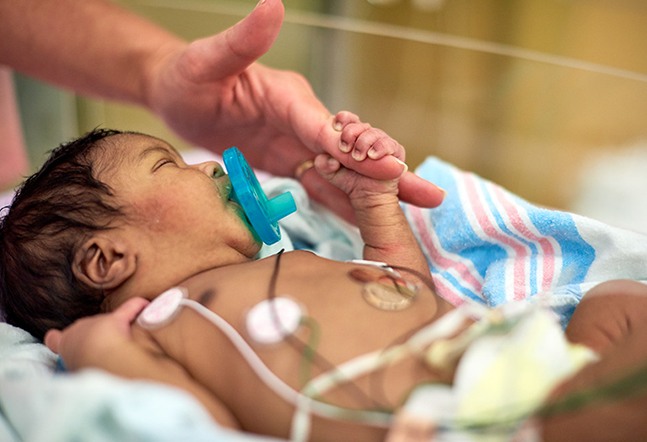Telemedicine Partnership Provides Rapid, Safer Neurologic Assessment for Newborns

For infants born with a brain injury or a congenital neurologic condition, rapid evaluation and response is crucial. Cincinnati Children’s neonatal neurologists have developed a partnership with area hospitals that provides specialized neurologic evaluation and care for medically fragile babies without transferring them from their birth hospitals.
Our neonatal neurology team - Mark Schapiro, MD; Cameron Thomas, MD, MS; Marissa Vawter-Lee, MD; and Charu Venkatesan, MD, PhD - work with neonatologists, nurses and technologists at four partner institutions. They offer in-person and telemedicine consults to manage acute neurological concerns.
In 2020, in addition to the infants cared for in Cincinnati Children’s Level IV NICU, the team provided telemedicine-based acute and follow-up care to nearly 50 newborns. The outreach program partners with two Level III NICUs in Cincinnati, one in Northern Kentucky and one in Dayton, Ohio. The partnership has grown and strengthened through shared expertise and a spirit of collaboration, says Thomas.
Minimizing Trauma for Infants - and Families
“Previously, if a baby was having seizures at another hospital, the baby would be transferred as quickly as possible to our NICU, but now we can keep many of these babies with their mothers, in a birth hospital closer to home,” he says. “This program has continued to grow steadily in large part because of the steady, longitudinal relationships our team has built with neonatal providers at other institutions.”
The consults are designed to mimic a bedside evaluation. Neonatologists from the birth hospital are present, with Cincinnati Children’s neonatal neurologists participating via a secure video connection. The neonatal neurologists conduct guided physical exams, talk with parents about findings, and discuss treatment plans and prognosis.
The importance of EEG monitoring
Another reason for the program’s success is its capability for EEG monitoring. When needed, Cincinnati Children’s is able to offer the partner hospitals robust data transfer and expertise in evaluating infant EEGs.
“It’s not unusual for these babies to have frequent seizures, and infant seizures are clinically difficult to recognize at the bedside,” says epileptologist Katherine Holland, MD, PhD. “Experience with this very young age group is essential, since seizures present differently in neonates than in older children and adults.”
Holland and her team train staff at partner institutions to set up the EEGs. The epileptologist reviews live readings or recorded data, depending on the partner hospital’s technical capabilities.
Long-term follow-up
Since many of these babies will require ongoing care, the neurologists are able to offer in-home telemedicine follow-up visits when appropriate. Developing ways to make access to care easier is a priority for these and other patients with neurologic concerns, says pediatric neurologist Don Gilbert, MD, MS.
“Once a child has been fully evaluated and the doctor is managing a long-term problem using medications and other therapies, there are situations where key information could be obtained by video,” he says.

